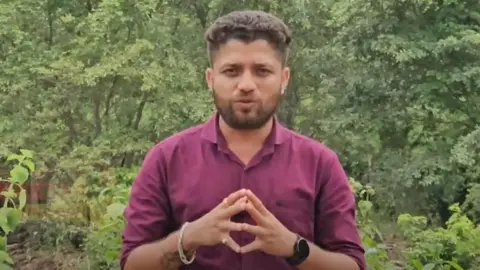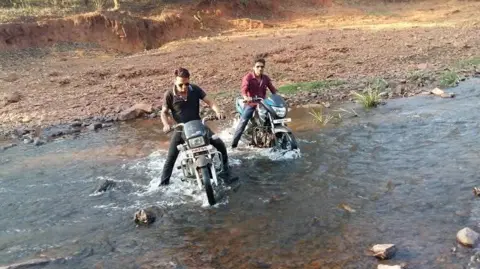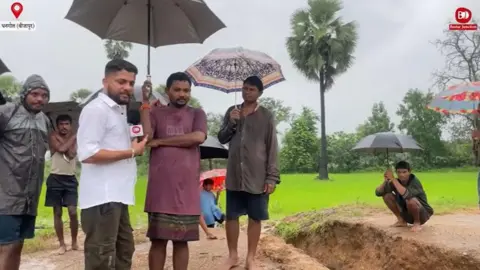[ad_1]
 Bastar Junction / YouTube
Bastar Junction / YouTubeThe ugly homicide of Indian journalist Mukesh Chandrakar has shone a highlight on the risks of reporting from a number of the nation’s most unstable areas.
Chandrakar’s physique was discovered final week in a septic tank in a compound owned by a contractor he had implicated in a narrative about corruption in Chhattisgarh state. Police have arrested the contractor and two others in reference to the 33-year-old’s homicide.
Chhattisgarh, a mineral-rich state, has witnessed an armed battle for greater than three many years and assaults by Maoist rebels on safety forces are widespread. The Maoists, who’re lively in a number of Indian states, say they’re combating for communist rule and better rights for tribal folks and the agricultural poor.
Chandrakar’s killing was condemned by Indian media watchdogs. Individuals who knew him counseled his bravery and resilience, with many saying he cared deeply about folks and would go to nice lengths to report on an vital story.
His dying additionally sparked discussions concerning the challenges confronted by unbiased reporters, usually working as stringers or freelancers, in states like Chhattisgarh, the place employment alternatives are few and the steadiness of energy is continually shifting between the state, rebel teams and highly effective mining firms.
Chandrakar was born in Basaguda, a distant village within the state, and dabbled in odd jobs earlier than he pivoted to journalism in his 20s.
His childhood was tough; he misplaced his father when he was nonetheless a toddler and was raised by his mom, who labored laborious to make ends meet. He additionally grew up within the shadow of violence as militia and insurgent teams fought for energy within the state.
To assist help his household, he initially collected mahua flowers, that are used to make a liquor standard amongst tribespeople, and later labored in a storage.
His good friend Ganesh Mishra instructed the PJ that Chandrakar found journalism by way of conversations with pals and commenced working as one in 2013. He learnt on the job, gleaning suggestions from fellow journalists, and step by step developed a ardour for reporting.
He labored as a reporter with mainstream media retailers earlier than launching his personal YouTube channel, Bastar Junction. On the time of his dying, the channel had round 165,000 subscribers, a quantity that has since grown by about 10,000.
Bastar is a hilly district in Chhattisgarh which is stuffed with dense forests and is a part of India’s ‘purple hall’, a nickname for the areas most affected by the Maoist insurgency.
 Ganesh Mishra
Ganesh MishraWatching the movies, Chandrakar’s journalism comes throughout as barely melodramatic and typically straying from the rigours of conventional reporting, equivalent to not all the time giving all events a proper of reply. Nevertheless, his movies highlighted tales incessantly neglected by mainstream media – studies of harmless villagers killed in crossfire between Maoist rebels and troopers, or tribal males wrongfully accused of being insurgents and imprisoned by the police.
His channel captured the hardships confronted by locals in Bastar’s distant villages, the place even fundamental requirements are scarce.
One video confirmed villagers swimming throughout a river with groceries in tow as a result of lack of a bridge; one other documented a key street mined with explosives, allegedly planted by Maoists to focus on safety forces. His tales gave locals a platform to voice their grievances and maintain public officers accountable.
Chandrakar used to additionally work as a “stringer” for information organisations, the place his job concerned offering outstation journalists with details about a narrative or typically, even chaperoning them by way of Maoist strongholds.
Most media retailers pay such freelance reporters poorly, and regardless of doing a lot of the bottom work, they usually do not obtain correct recognition or a byline.
A journalist who Chandrakar helped cowl a very delicate story instructed the PJ about how he had helped him cross Maoists camps and police check-posts to entry areas deep inside forests.
“It might have been unimaginable to entry the terrain with out him,” the individual, who wished to stay nameless, stated.
He described Chandrakar as an individual who was enthusiastic about new experiences, cherished the chase and felt proud when his actions led to alter.
“He was additionally a deeply aspirational individual. He did not wish to be outlined by his tough life; he wished to rise above that,” he stated.
It is maybe this trait of Chandrakar’s that has led to some hypothesis concerning the precise reason behind his dying. Police say that two of the folks arrested for his homicide are associated to him, one in all whom is a contractor.
There are whispers about Chandrakar’s way of life, which some colleagues discovered puzzling given the poor salaries of native journalists. In a tribute, his shut good friend and fellow journalist, Dipankar Ghose, acknowledged the complexities of working in a career the place survival usually meant navigating tough decisions.
“For me, Mukesh was the personification of bravery. I am not going to fake that in a universe the place media organisations he [Chandrakar] labored for did not even pay for his petrol not to mention a secure wage, sustenance wasn’t an issue, and due to this fact some wires weren’t crossed. However Mukesh cherished journalism with a ardour,” he wrote as a part of a prolonged post praising Chandrakar on X.
 Bastar Junction / YouTube
Bastar Junction / YouTubeManisha Pande, managing editor at Newslaundry, an unbiased information platform, speaks concerning the challenges going through journalists in lots of small cities and cities throughout the nation.
“There are lots of passionate and even fearless younger journalists who’re the primary to uncover and report tales from their areas. However as a career, we have not discovered easy methods to make journalism financially sustainable for them,” she says.
Chandrakar’s homicide continues to be beneath investigation, and extra particulars about his dying are anticipated to emerge within the coming days. Nevertheless, his work continues to function an inspiration to many.
“I’ve misplaced a good friend who was like a member of the family and Bastar has misplaced a great journalist,” Mr Mishra says. “His journalism impacted many and so his loss is deeply felt deeply by all”.
*Some names within the story have been withheld on request.
[ad_2]
[ad_1]
#Mukesh #Chandrakar #Journalists #homicide #highlights #dangers #reporting #smalltown #India
[ad_2]
, 2025-01-08 07:53:00





